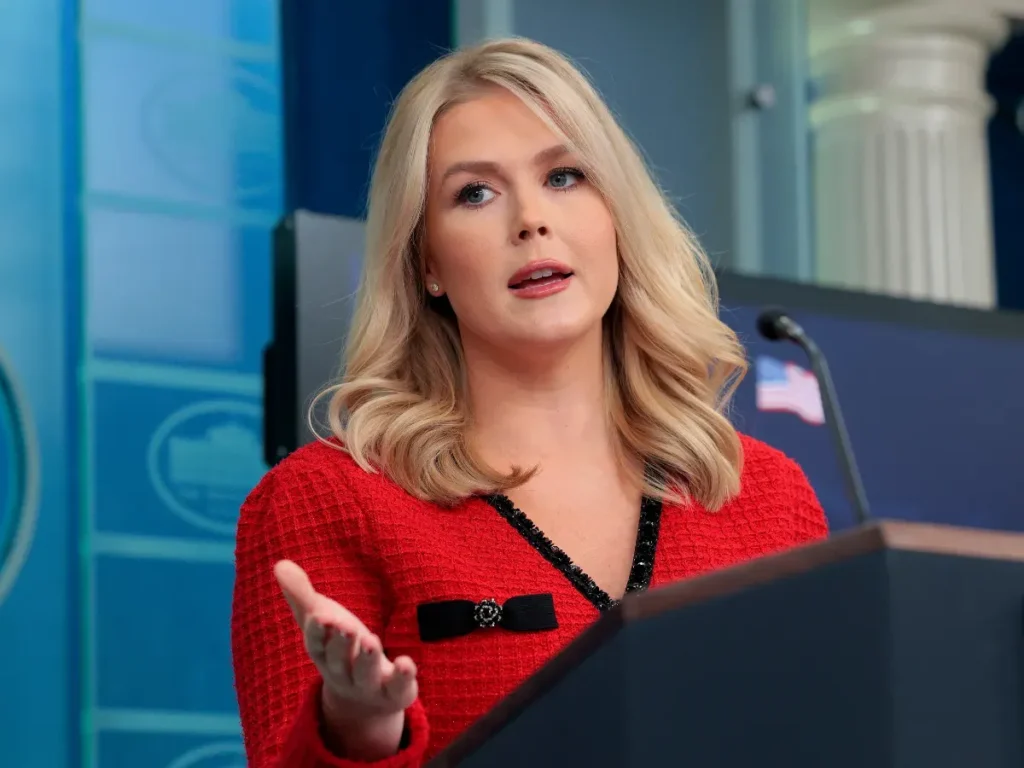Live TV Showdown: Karoline Leavitt Shuts Down Jimmy Kimmel with One Savage Line That Left the Room Speechless
In a moment no one saw coming, late-night TV turned into a verbal battlefield when Jimmy Kimmel took a low blow at Karoline Leavitt during what was supposed to be harmless banter. But Kimmel’s smug jab backfired spectacularly.
Leavitt, cool as ice, fired back with a blistering one-liner that not only left Kimmel visibly shaken—it brought the audience to a stunned silence, followed by gasps and murmurs. The tension was palpable.
Now, the internet is eating it up. Social media is ablaze with praise for Leavitt’s fearless takedown, calling it a “masterclass in composure and clapbacks.”
Curious what she said that shut Kimmel down cold? Watch the full exchange below—it’s the mic-drop moment of the year.👇👇

The Pentagon’s Silent Stance: Is It About National Security—or Political Optics?
Tensions ran high in the White House press briefing room as reporters pressed for answers on the rationale behind classifying launch times for sensitive military operations. What was framed as a matter of national security quickly spiraled into a politically charged exchange, raising a deeper question: Are these classifications genuinely about protecting American lives—or shielding decision-makers from political fallout?
Behind the Veil: “Various Reasons” and the Fog of Secrecy
When pressed, officials cited “various reasons” for the secrecy—without offering specifics. The answer, vague and unsatisfying, deferred to a statement from the Secretary of Defense, but lacked the transparency many expected. What are these “various reasons”? And why is articulating them publicly considered too risky?
Rather than reinforcing trust, the ambiguity breeds suspicion. Critics argue that such opacity may be less about operational security and more about insulating the administration from criticism over controversial decisions.
The Goldberg Distraction: Deflecting Accountability Through Partisan Framing
The tone shifted dramatically when the conversation turned toward the journalist raising the questions—Jeffrey Goldberg. Dismissing him as a “registered Democrat” and “anti-Trump sensationalist” appeared less like a rebuttal and more like a tactic to delegitimize the critique. But does Goldberg’s political affiliation negate the substance of his questions?
The timing of the inquiry—just ahead of a global threat assessment—only intensified speculation. Is this deflection a time-tested political strategy: attack the messenger when the message hits too close to home?
Weaponizing Afghanistan: Echoes of Past Failures
As the debate wore on, references to the chaotic withdrawal from Afghanistan reemerged—specifically, the tragic loss of 13 service members. Though emotionally charged, invoking that event to question the current administration’s handling of military transparency risks politicizing tragedy. It distracts from the immediate issue: why launch times are being withheld and whether the justification holds up under scrutiny.
Statements about taking decisions involving American lives with the “utmost responsibility” rang hollow for some, especially given the administration’s record. And the defense that a launch time was mistakenly included in a messaging thread? To many, it felt more like a convenient excuse than a credible explanation.
At the Core: Trust, Transparency, and the Price of Evasion
This moment raises crucial questions about the balance between national security and public accountability. Transparency doesn’t always mean full disclosure—but evasion, especially under the guise of security, risks eroding public trust. In an age when narratives move faster than facts, clarity isn’t just preferable—it’s essential.

Job Security or Just Evasion? When Protection Becomes a Shield Against Accountability
Perhaps the most unsettling moment in the entire exchange came with an unequivocal declaration: “No one will lose their job at all because of this.” Rather than offering reassurance, this blanket guarantee raises red flags. It signals an unwillingness to accept responsibility—no matter the outcome. In effect, it sends a chilling message: political loyalty outweighs competence, and even critical mistakes will be tolerated if the right allegiances are maintained.
What was intended to calm concerns may, in fact, deepen them. It suggests an administration more invested in self-preservation than in ensuring the safety and well-being of its service members. The absence of accountability not only erodes public trust—it fosters a dangerous culture where errors are quietly absorbed rather than corrected. And in the realm of national security, that complacency can carry catastrophic consequences.
Beyond Politics: A Call for Transparency and Real Leadership
At the heart of this debate lies a fundamental tension: the public’s right to understand versus the government’s duty to protect. Questions about the classification of launch times—and the administration’s evasive answers—highlight the need for balance. Operational security is essential, yes. But using it as a blanket justification to withhold information or silence criticism undermines democratic accountability.
This isn’t a partisan issue. It’s a matter of leadership, integrity, and a nation’s commitment to those who risk their lives in service. The American people deserve more than vague statements and political theater. They deserve clarity, responsibility, and a government that values truth as much as it values power.